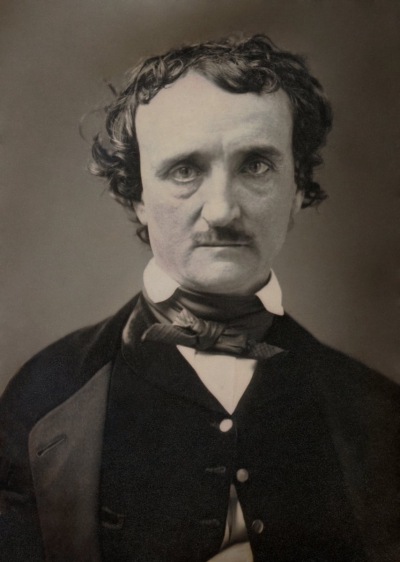The death of Edgar Allan Poe on October 7, 1849, has remained mysterious. The circumstances leading up to the final days of Edgar Allan Poe are uncertain, and the cause of death is disputed. On October 3, the American author was found delirious in Baltimore, Maryland, "in great distress, and ... in need of immediate assistance", according to the man who found him, Joseph W. Walker. He was taken to the Washington College Hospital, where he died at 5 a.m. on Sunday, October 7. He was 40 years old. Poe was never able to explain how he came to be in this condition.
Much of the extant information about the last few days of Poe's life comes from his attending physician, John Joseph Moran, though his credibility is questionable. Poe was buried after a small funeral at the back of Westminster Hall and Burying Ground, but his remains were moved to a new grave with a larger monument in 1875. The newer monument also marks the burial place of Poe's wife, Virginia, and his mother-in-law, Maria. Theories as to what caused Poe's death include suicide, murder, cholera, hypoglycemia, rabies, syphilis, influenza, and that Poe was a victim of cooping. Evidence of the influence of alcohol is strongly disputed.After Poe's death, Rufus Wilmot Griswold wrote his obituary under the pseudonym "Ludwig". Griswold, who became the literary executor of Poe's estate, was actually a rival of Poe and later published his first full biography, depicting him as a depraved, drunk, drug-addled madman. Much of the evidence for this image of Poe is believed to have been forged by Griswold, and though friends of Poe denounced it, this interpretation had lasting impact.
Edgar Allan Poe (; born Edgar Poe; January 19, 1809 – October 7, 1849) was an American writer, poet, editor, and literary critic. Poe is best known for his poetry and short stories, particularly his tales of mystery and the macabre. He is widely regarded as a central figure of Romanticism in the United States, and of American literature. Poe was one of the country's earliest practitioners of the short story, and considered to be the inventor of the detective fiction genre, as well as a significant contributor to the emerging genre of science fiction. Poe was the first well-known American writer to earn a living through writing alone, resulting in a financially difficult life and career.Poe was born in Boston, the second child of actors David and Elizabeth "Eliza" Poe. His father abandoned the family in 1810, and when his mother died the following year, Poe was taken in by John and Frances Allan of Richmond, Virginia. They never formally adopted him, but he was with them well into young adulthood. He attended the University of Virginia but left after a year due to lack of money. He quarreled with Allan over the funds for his education, and his gambling debts. In 1827, having enlisted in the United States Army under an assumed name, he published his first collection Tamerlane and Other Poems, credited only to "a Bostonian". Poe and Allan reached a temporary rapprochement after the death of Allan's wife in 1829. Poe later failed as an officer cadet at West Point, declared a firm wish to be a poet and writer, and parted ways with Allan.
Poe switched his focus to prose and spent the next several years working for literary journals and periodicals, becoming known for his own style of literary criticism. His work forced him to move among several cities, including Baltimore, Philadelphia, and New York City. In 1836, he married his 13-year-old cousin, Virginia Clemm, but she died of tuberculosis in 1847. In January 1845, Poe published his poem "The Raven" to instant success. He planned for years to produce his own journal The Penn (later renamed The Stylus), but before it could be produced, he died in Baltimore on October 7, 1849, at age 40, under mysterious circumstances. The cause of his death remains unknown, and has been variously attributed to many causes including disease, alcoholism, substance abuse, and suicide.Poe and his works influenced literature around the world, as well as specialized fields such as cosmology and cryptography. He and his work appear throughout popular culture in literature, music, films, and television. A number of his homes are dedicated museums today. The Mystery Writers of America present an annual award known as the Edgar Award for distinguished work in the mystery genre.

1849Oct, 3
American author Edgar Allan Poe is found delirious in a gutter in Baltimore under mysterious circumstances; it is the last time he is seen in public before his death.
Choose Another Date
Events on 1849
- 13Feb
Franz Joseph I of Austria
The delegation headed by Metropolitan bishop Andrei Șaguna hands out to the Emperor Franz Joseph I of Austria the General Petition of Romanian leaders in Transylvania, Banat and Bukovina, which demands that the Romanian nation be recognized. - 29Mar
Punjab region
The United Kingdom annexes the Punjab. - 14Apr
Lajos Kossuth
Hungary declares itself independent of Austria with Lajos Kossuth as its leader. - 3Jul
Italian unification
The French enter Rome in order to restore Pope Pius IX to power. This would prove a major obstacle to Italian unification. - 17Sep
Harriet Tubman
American abolitionist Harriet Tubman escapes from slavery.

 English
English  español
español  français
français  português
português  русский
русский  العربية
العربية  简体中文
简体中文 